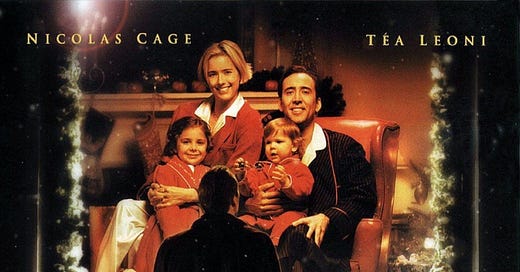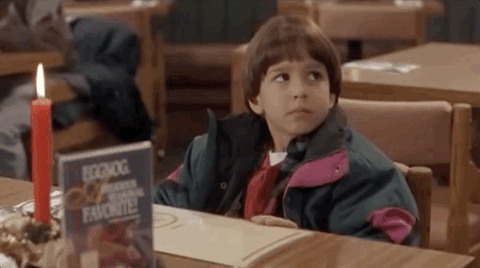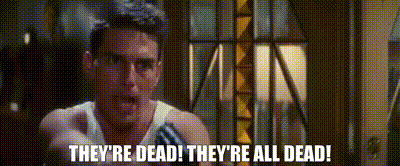A Nicolas Cage film taught me everything I need to know about life
My attempt at cultural relevance: disagreeing with a long-dead film critic about a 22-year-old Christmas movie, after Christmas
I know what you’re thinking: it’s Con Air.
But you’d be wrong. Read on to find out which Nick Cage movie unlocks the secrets of the universe! (Your second and third guesses are Face/Off and The Wicker Man, but those are wrong, too. You’re closer if you guess The Croods, but still not it.)
This holiday season I stumbled into a fun trip down memory lane by rewatching a bunch of 90s(ish) Christmas classics.
National Lampoon’s Christmas Vacation, I don’t even need to watch anymore, I have memorized virtually the whole thing. It’s so useful in everday life! (Bend over and I’ll show ya; are you serious Clark?; Fixed the newel post!; If I woke up tomorrow with my head sewn to the carpet, I wouldn’t be more surprised than I am right now; SQUIRREL!!!!; etc.)
Home Alone, which Harry loves and calls “Him Alone.” He also says les incompetents beautifully.
The Santa Clause. Another quotable one. “Plain milk’s fine” is used year-round in my house to express resigned acceptance.
The Preacher’s Wife. Whitney Houston, RIP, what a tragedy.
Christmas-adjacent gems like You’ve Got Mail, When Harry Met Sally, and the Winona Ryder version of Little Women, which I just learned this week Noah had never seen before.1
But the one I’m going to write about more thoroughly today is that evergreen national favorite that people won’t stop talking about…The Family Man, starring Nicholas Cage, Tea Leoni, Jeremy Piven, and Don Cheadle.
In case you haven’t seen it (but who among us hasn’t!??!) the plot overview is, Nick Cage’s character Jack chooses a life of prestige and money over marrying his college sweetheart, Tea Leoni’s character, Kate. Thanks to a supernatural Don Cheadle, Jack wakes up in an alternate life where he chooses Kate instead.
I must admit that I never made the connection to this film being It’s a Wonderful Life, but in reverse, until this year. Partly because back when The Family Man came out, I hadn’t seen IAWL. And then because I hadn’t seen The Family Man in many years, so the two cross-pollinated my mind only now.
Roger Ebert, God rest him, was wrong
Back when this movie came out, the internet was new enough that even movie posters had to include instructions on how to Surf the Web.2 So there weren't going to be hundreds of Hot Takes and movie reviews; if you were a normal person, you had to see a movie and then decide if you liked it. And I liked it! But I was curious, based on the Rotten Tomatoes scores, what reviewers at the time actually said. Roger Ebert only gave it 2.5 stars. He, too, liked it, but opened the review with this:
It's a funny thing about supernatural movies. The black characters are always the ones with all the insights into the occult, but they never get to be the occulted.3
So there was that, which is true. He ended the review by saying, “The movie is sweet, light entertainment, but could have been more.”
One of his criticisms, aside from the relegation of Cheadle’s talent, was: “how do you dispose of the family in the alternative world after the supernatural visitor learns his lesson?” Near the end of the movie, of course, Jack wakes up on Christmas morning to discover that the glimpse of his life with Kate, their two adorable children, were all a dream (or something).
But Ebert can suck it because, in fact, The Family Man is made better by the tragedy of it: those cute kids we just spent two hours getting to know, that lovely middle-class, underachieving life, don’t exist. Jack’s ambition—which did lead to success!—killed the very possibility of them.
In some ways, it’s the most bleak Christmas movie I’ve ever seen.4
There’s something about Mary
My friend Sarah recently shared a fantastic, unusual take on IAWL and the overlooked centrality of George’s wife, Mary. I suggest reading the entire article, which is excellent (“There Is No Mary Problem in ‘It’s a Wonderful Life’” by Clare Coffey), but this passage is key:
She is, as much as George, a profoundly unusual person laboring under her own personal destiny. In the world where George does not exist, she has not married not because she couldn’t, but because she does not want to. There is not a Mary-sized man in town, and Mary Hatch does not do anything just because it’s what might be expected of her. Her story in this counterfactual is a sad one, but it is not one of passive submission to circumstance.
To be chosen and known and loved by such a woman is not a small thing. It is seeing Mary without him that breaks George enough to make him ask for life, as it is her just anger at him that sends him into the most desperate phase of his downward spiral. When he chases the alternate Mary through the streets, his desperate cry is not “Mary! What have they done to you?” but “Don’t you know me? What’s happened to us?” If Mary does not know him, if Mary does not see who he really is, he must not exist indeed.
In The Family Man, the potency is given to Leoni’s Kate. The factual Kate, like the counterfactual Mary, never married. Instead of Mary’s drab spinster librarian (though my amazing librarian/professor friend Kathleen will defend librarianship till her last breath), Kate is a high-powered, succesful lawyer about to go run her firm’s Paris office (not a pro-bono lawyer in New Jersey, a total chump career she would’ve had if she’d married Jack).
Instead of teaching Jack that he has everything he needs (which, materially, he does), the glimpse shows him that without his relationship with Kate, he’s just a suit. An expensive, well-tailored suit, but lonely and important to no-one. He’s the center of his own universe, a solitary Ego surrounding himself with beauty and luxury, but feeling nothing.5 Had he chosen Kate, together they’d be the center of their children’s universe, a stable gravity well for their friends and family.
Death, death and more death
It’s a Wonderful Life’s pivotal moment is a suicide attempt. That’s dark. The Family Man’s tragedy is the family that never was. Iona Italia wrote about her friend Bruce, who died by suicide a few days after Christmas six years ago:
In the vast universe, there is a chance that this may be the only planet to host sentient life. And, for a very brief instant, between two endless expanses of nothingness, we are here, alive. It’s a miracle we should never take for granted. Against astronomical odds, we’re sealed in the book of life and the plot can twist at any moment. The story is not over until you close the book on the last page.
About ten or so days before Christmas this year, dancer Stephen “tWitch” Boss committed suicide, leaving behind a wife and three children. Just days before his death, he posted an anniverary tribute to his wife and a current video of them dancing together, which they did constantly.
Suicide is one of a very small handful of things that viscerally upset me. Like Iona Italia, I see hope everywhere. She goes on to say that her philosophy is, bringing happiness to others is life’s highest purpose.
I’ve written before about James Herriot’s work, and in one book he tells the story of a villager who committed suicide after his dog died. Not long after, another client’s dog went blind; that man, though, was open about his despair. Herriot encouraged the man to view caring for his dog as a reason for living. The duo, together, thrived.
Herriot never delved deeply into his own psyche, but in a posthumous biography, his son reveals that Herriot endured recurrent bouts with depression. But, through his work as a veterinarian and a writer, he clearly expressed the belief that being of service to some other living being, bringing happiness, was enough.
Great expectations
I guess my point is, the holiday season is obviously fraught for many people. Perhaps some of the difficulty could be solved if we adjusted our expectations. I don’t know why we imagine the Perfect White Christmas(TM) and feel we’re coming up short, because no Christmas movie or song worth its salt promotes such a notion. Sure we could lay some blame at the feet of capitalism, but who among us actually expects a diamond tennis bracelet or a Buick with a bow on it?
Maybe what we’re really worried about is being valuable to our loved ones, but because our context is consumerism, we act out that need in ritualistic gift giving. If we can’t find the perfect gift, or buy enough gifts, maybe that means we aren’t providing value to those we love. No amount of being told “you are loved, you are valuable to me” will fill the reservoir of meaning if we can’t believe that we are loved, worthy of love. So we try to prove it to ourselves, by buying people things that will evoke a reaction of gratitude and joy. That way we know they appreciate us: the gift stands in for our self.
No amount of telling a person “you are loved, you are valuable to me” will save them from their own stubborn disbelief. And in that disbelief, some people become mired in despair.
Writer Michelle Jia recently posted an interesting piece on “squandering potential.”
Social reality is built upon games — upon arrangements of people, gestures, acts, incantations that have agreed-upon meanings. Sometimes these games are so engrossing that we do not recognize they are constructed — as in many religious rites to the faithful — and sometimes these games are transparently, well, games — as in the FIFA World Cup. …
The belief in one’s own potential is such a game — as is the idea that we owe it to society to be as ambitious as possible; to maximize our achievements, our impact, or our profit. I believe ardently that we seem to spontaneously crave the bettering of ourselves and each other, but I reject the idea that this “bettering” should and must be narrowly defined to suit societal definitions of productivity, progress and/or growth.
The social contract, work, sports, manners, higher education, The Perfect Family Christmas: these are all games we play. Tragedy strikes when we confuse playing for purpose—and losing for failure.
Our expectations are the problem. Changing them just might be the solution.
In conclusion…
I give The Family Man 3 stars.
May it be known I didn’t sit and watch every moment of each of these movies; a lot of times they were on in the background.
If you were not sure how to find information about this film, the movie poster helpfully includes “AOL Keyword: Family Man.”
Times have changed! I wonder how Ebert would’ve felt about Jordan Peele’s movies.
Despite the fact that throughout the years of parenting infants, Noah and I have oft quoted Jack’s hilariously deadpan line, “That baby is crying.”
Consider this my pitch to Disney: the next MCU film is a reboot of The Family Man where Jack is Star-Lord’s father, only in this version Ego is played by Nicholas Cage and Jack is played by Don Cheadle reprising his role as War Machine.







This was so much fun to read! I may be one of few who never saw Family Man. I will watch it this week! Happy new Year!
"No amount of telling a person “you are loved, you are valuable to me” will save them from their own stubborn disbelief. And in that disbelief, some people become mired in despair."
Of course, each reason is individual... but I think it's often more a feeling of "I don't //deserve// to be loved" rather than a disbelief that one is loved. Definitely that doomy feeling of the narrative of one's life being over is often key, I suspect, though.